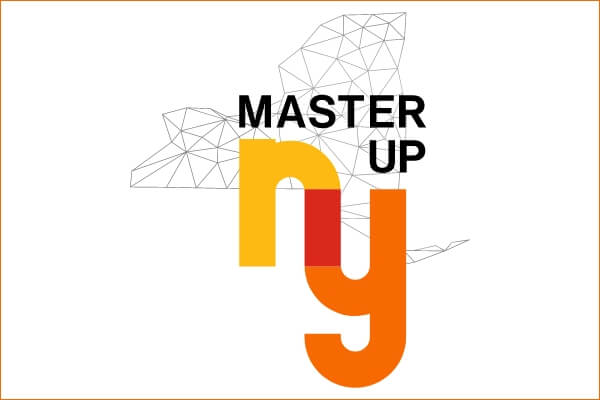Business Analytics Master of Science Degree

Business Analytics
Master of Science Degree
- RIT /
- Saunders College of Business /
- Academics /
- Business Analytics MS
RIT’s master’s in business analytics teaches you to harness the power of data analysis to drive and optimize business performance, strategy, and operations at the intersection of business, data science, and analytics.
$105.9K
Average First-Year Salary of RIT Graduates from this degree
190%
Demand Growth for AI
245%
Demand Growth for Blockchain
Overview for Business Analytics MS
Why Study RIT's Master's of Business Analytics
STEM-OPT Visa Eligible: The STEM Optional Practical Training (OPT) program allows full-time, on-campus international students on an F-1 student visa to stay and work in the U.S. for up to three years after graduation.
The business analytics master’s degree is a natural extension of RIT’s top-ranked management information systems program.
Acquire broad and in-depth training in multiple disciplines related to business analytics, including management information systems, marketing, accounting, finance, management, and engineering.
Gain control of Big Data to deliver powerful analytics solutions to help companies make better business decisions.
Students have the opportunity to receive an advanced certificate in accounting and financial analytics.
Today’s businesses collect an incredible amount of data from nearly every customer touchpoint, from point-of-sale transactions, customer service interactions, social media feedback, search engine entries, market research activities, sales data, demographic information, and more. Right now, only a tiny portion of this data is analyzed and used to guide and inform business decisions. By earning a business analytics master’s degree, you’ll become skilled in using big data to create powerful solutions to help companies increase sales, reach new customers, develop new products, enhance customer experiences, and more.
RIT’s Business Analytics Master’s Degree
Developed in conjunction with top employers–such as Amazon, Tesla, Intuit, Excellus, and PriceWaterhouse, the master’s in business analytics trains students to help them understand and connect contemporary analytics technologies with today’s business practices.
In our business analytics courses, you’ll develop the advanced skills needed to conduct the descriptive, diagnostic, predictive, and prescriptive analysis of information as you learn to manage data and analytics in a range of business settings.
Business Analytics Courses Packed With High-Demand Skills
In RIT’s business analytics degree, you’ll acquire broad and in-depth training in multiple disciplines related to business analytics like accounting information and analytics, advanced business analytics, business intelligence, accounting analytics, financial analytics, and marketing analytics. Dive deeper into a discipline that enhances your career goals with analytics elective courses in topics such as predictive analytics, information systems design, data management and analytics, categorical data analysis, and more.
Learn in High-Tech Analytics Labs
You’ll pair your master’s in business analytics with access to two high-tech labs. The Sklarsky Center for Business Analytics, a modern, interactive lab that features Bloomberg Terminals and the most advanced analytics software. The REDCOM Active Learning Collaboratory supports interactive learning and features CISCO Telepresence for connecting interactively with RIT’s global campuses in China, Croatia, Dubai, and Kosovo, and our corporate partners around the world.
 Play video: Business Analytics MS at RIT Saunders College, with professor Manlu Liu
Play video: Business Analytics MS at RIT Saunders College, with professor Manlu Liu
Program Director Manlu Liu discusses the Business Analytics program
-
Join us for Fall 2025
Many programs accept applications on a rolling, space-available basis.
-
Next Steps to Enroll
Accept your offer of admission and take the next steps toward becoming an RIT Tiger.
-
30% Tuition Scholarship for NY Residents and Graduates
Now is the perfect time to earn your Master’s degree. If you’re a New York state resident with a bachelor’s degree or have/will graduate from a college or university in New York state, you are eligible to receive a 30% tuition scholarship.
Careers and Experiential Learning
Typical Job Titles
| Analytics Consultant | Business Analyst | Business Intelligence Director |
| Chief Information Officer (CIO) | Chief Data Officer (CDO) | Cost Analyst |
| Credit Risk Analyst | Data Analytics Manager | Data Architect |
| Data Scientist | Digital Specialist | Data Visualization Specialist |
| Enterprise Architect | Financial Analyst | Intelligence Engineer |
| Marketing Research Analyst | Operations Analyst | Risk Management |
| Supply Chain Analytics | Web Intelligence |
Careers in Business Analytics
Graduates of RIT's master’s in business analytics are prepared for outstanding career opportunities in a range of positions. Our alumni are employed at diverse firms such as Bonadio, Dow Jones & Co., Excellus BCBS, Digital Factory Inc., Mindex Technologies Inc., Tata Consultancy Services, Citibank, CooperVision, Ernst & Young LLP (EY), TikTok, and more. Our Management Information Systems Advisory Board helps students prepare for their careers by ensuring the curriculum is continuously updated.
Cooperative Education and Internships
What makes an RIT education exceptional? It’s the ability to complete relevant, hands-on career experience. At the graduate level, and paired with an advanced degree, cooperative education and internships give you the unparalleled credentials that truly set you apart. Learn more about graduate co-op and how it provides you with the career experience employers look for in their next top hires.
Co-ops and internships take your knowledge and turn it into know-how. Business co-ops provide hands-on experience that enables you to apply your knowledge of business, management, finance, accounting, and related fields in professional settings. You'll make valuable connections between course work and real-world applications as you build a network of professional contacts.
Cooperative education is optional but strongly encouraged for graduate students in the business analytics master’s degree.
Featured Work and Profiles
-
Deloitte, New York, NY
Paphawarintr (Mind) Tienpasertkij, co-op ’21 "Saunders provides hands-on experiences that allow students to challenge themselves in order to solve business problems in the real world. Through my courses at Saunders, I have been able to...
Read More about Deloitte, New York, NY -
The Bonadio Group, Rochester, NY
Rushabh Shah ’20 "I chose Saunders because its curriculum is the perfect combination of technology and business, which appeals to me as an engineer and is aligned with the business environment's current trends. The...
Read More about The Bonadio Group, Rochester, NY -
Less Is More In Semiconductor Manufacturing
Ali Tosyali Reducing sensors lowers costs, improves reliability
Read More about Less Is More In Semiconductor Manufacturing -
Research Insights: Health Communication Technology and COVID-19
Emi Moriuchi, Quang Bui The effects of dashboards and tracking apps on gaining compliance
Read More about Research Insights: Health Communication Technology and COVID-19 -
TikTok, New York City
Dana DiVincenzo ’22 "I chose Saunders because my program's curriculum included hard analytical skills and focused on providing their students real-world experience and business connections."
Read More about TikTok, New York City -
Research Insights: Ethics and algorithmic decision-making systems
Sean Hansen Should Australian banks monitor gambling tendencies
Read More about Research Insights: Ethics and algorithmic decision-making systems
Curriculum for 2024-2025 for Business Analytics MS
Current Students: See Curriculum Requirements
Business Analytics, MS degree, typical course sequence
| Course | Sem. Cr. Hrs. | |
|---|---|---|
| First Year | ||
| ACCT-745 | Accounting Information and Analytics |
3 |
The objective for this course is helping students develop a data mindset which prepare them to interact with data scientists from an accountant perspective. This course enables students to develop analytics skills to conduct descriptive, diagnostic, predictive, and prescriptive analysis for accounting information. This course focuses on such topics as data modeling, relational databases, blockchain, visualization, unstructured data, web scraping, and data extraction. (Prerequisites: ACCT-110 or ACCT-603 or equivalent course.) Lecture 3 (Fall, Summer). | ||
| BANA-680 | Data Management for Business Analytics |
3 |
This course introduces students to data management and analytics in a business setting. Students learn how to formulate hypotheses, collect and manage relevant data, and use standard tools such as Python and R in their analyses. The course exposes students to structured data as well as semi-structured and unstructured data. There are no pre or co-requisites; however, instructor permission is required for students not belonging to the MS-Business Analytics or other quantitative programs such as the MS-Computational Finance which have program-level pre-requisites in the areas of calculus, linear algebra, and programming. Lecture 3 (Fall). | ||
| BANA-780 | Advanced Business Analytics |
3 |
This course provides foundational, advanced knowledge in the realm of business analytics. Advanced topics such as machine learning, analysis of structured data, text mining, and network analysis are covered. Industry standard tools such as R and Python are extensively used in completing student projects. (Prerequisite: BANA-680 or equivalent course.) Lecture 3 (Spring). | ||
| BANA-785 | Business Analytics Experience |
3 |
Students apply their mathematical, data analytic, and integrative business analytics skills in a complex project involving real or simulated data. Under the supervision of an advisor, students work in teams to perform a stipulated task/project and write a comprehensive report at the end of the experience. Subject to approval by the program director, an individual student internship/coop followed by an in-depth report may obtain equivalent credit. (Prerequisite: BANA-780 or equivalent course.) Lecture 3 (Summer). | ||
| FINC-780 | Financial Analytics |
3 |
This course provides a survey of financial analytics applications in contexts such as investment analysis, portfolio construction, risk management, and security valuation. Students are introduced to financial models used in these applications and their implementation using popular languages such as R, Matlab, and Python, and packages such as Quantlib. A variety of data sources are used: financial websites such as www.finance.yahoo.com, government sites such as www.sec.gov, finance research databases such as WRDS, and especially Bloomberg terminals. Students will complete projects using real-world data and make effective use of visualization methods in reporting results. There are no pre or co-requisites; however, instructor permission is required – student aptitude for quantitative work will be assessed; waived for students enrolled in quantitative programs such as the MS-Computational Finance which have pre-requisites in the areas of calculus, linear algebra, and programming. Lecture 3 (Fall). | ||
| MGIS-650 | Introduction to Data Analytics and Business Intelligence |
3 |
This course serves as an introduction to data analysis including both descriptive and inferential statistical techniques. Contemporary data analytics and business intelligence tools will be explored through realistic problem assignments. Lecture 3 (Fall). | ||
| MKTG-768 | Marketing Analytics |
3 |
This course provides an overview of marketing analytics in the context of marketing research, product portfolios, social media monitoring, sentiment analysis, customer retention, clustering techniques, and customer lifetime value calculation. Students will be introduced to, mathematical and statistical models used in these applications and their implementation using statistical tools and programming languages such as SAS, SPSS, Python and R. Multiple data sources will be used ranging from structured data from company databases, scanner data, social media data, text data in the form of customer reviews, and research databases. Students will complete guided projects using real time data and make effective use of visualization to add impact to their reports. There are no listed pre or co-requisites; however, instructor permission is required – student aptitude for quantitative work will be assessed; waived for students enrolled in quantitative programs such as the MS-Computational Finance which have pre-requisites in the areas of calculus, linear algebra, and programming. Lecture 3 (Spring). | ||
Analytics Elective |
3 | |
Open Elective |
6 | |
| Total Semester Credit Hours | 30 |
|
Analytics Electives
| Course | ||
|---|---|---|
| MGIS-720 | Information Systems Design |
|
This course provides students with fundamental knowledge and skills required for successful analysis of problems and opportunities related to the flow of information within organizations and the design and implementation of information systems to address identified factors. Students are provided with knowledge and experience that will be useful in determining systems requirements and developing a logical design. Lecture 3 (Fall). | ||
| MGIS-725 | Data Management and Analytics |
|
This course discusses issues associated with data capture, organization, storage, extraction, and modeling for planned and ad hoc reporting. Enables student to model data by developing conceptual and semantic data models. Techniques taught for managing the design and development of large database systems including logical data models, concurrent processing, data distributions, database administration, data warehousing, data cleansing, and data mining. Lecture 3 (Spring). | ||
| MGIS-735 | Design and Information Systems |
|
Students who complete this course will understand the principles and practices employed to analyze information needs and design appropriate IT-based solutions to address business challenges and opportunities. They will learn how to conduct requirements analysis, approach the design or redesign of business processes, communicate designs decisions to various levels of management, and work in a project-based environment. Lecture 3 (Spring). | ||
| MGIS-758 | Seminar in Management Information Systems |
|
Special topics seminars offer an in-depth examination of current events, issues and problems unique to MIS. Specific topics will vary depending upon student and faculty interests and on recent events in the business world. Seminar topics for a specific semester will be announced prior to the course offering. These seminars may be repeated for credit since topics will normally vary from semester to semester. (Instructor determined) Lecture 3 (Fall, Spring). | ||
| MGIS-760 | Integrated Business Systems |
|
This course focuses on the concepts and technologies associated with Integrated Business Information Systems and the managerial decisions related to the implementation and ongoing application of these systems. Topics include business integration and common patterns of systems integration technology including enterprise resource planning (ERP), enterprise application integration (EAI) and data integration. The key managerial and organizational issues in selecting the appropriate technology and successful implementation are discussed. Hands-on experience with the SAP R/3 system is utilized to enable students to demonstrate concepts related to integrated business systems. (familiarity with MS Office suite and Internet browsers) Lecture 3 (Spring). | ||
| STAT-641 | Applied Linear Models - Regression |
|
A course that studies how a response variable is related to a set of predictor variables. Regression techniques provide a foundation for the analysis of observational data and provide insight into the analysis of data from designed experiments. Topics include happenstance data versus designed experiments, simple linear regression, the matrix approach to simple and multiple linear regression, analysis of residuals, transformations, weighted least squares, polynomial models, influence diagnostics, dummy variables, selection of best linear models, nonlinear estimation, and model building. (This class is restricted to students in the APPSTAT-MS, SMPPI-ACT, or APPSTAT-U programs.) Lecture 3 (Fall, Spring, Summer). | ||
| STAT-745 | Predictive Analytics |
|
This course is designed to provide the student with solid practical skills in implementing basic statistical and machine learning techniques for the purpose of predictive analytics. Throughout the course, many real world case studies are used to motivate and explain the strengths and appropriateness of each method of interest. In those case studies, students will learn how to apply data cleaning, visualization, and other exploratory data analysis tools to a variety of real world complex data. Students will gain experience with reproducibility and documentation of computational projects and with developing basic data products for predictive analytics. The following techniques will be implemented and then tested with cross-validation: regularization in linear models, regression and smoothing splines, k-nearest neighbor, and tree-based methods, including random forest. (Prerequisite: This class is restricted to students in APPSTAT-MS and SMPPI-ACT who have successfully completed STAT 611 and STAT-741 or equivalent courses.) Lecture 3 (Spring). | ||
| STAT-747 | Principles of Statistical Data Mining |
|
This course covers topics such as clustering, classification and regression trees, multiple linear regression under various conditions, logistic regression, PCA and kernel PCA, model-based clustering via mixture of gaussians, spectral clustering, text mining, neural networks, support vector machines, multidimensional scaling, variable selection, model selection, k-means clustering, k-nearest neighbors classifiers, statistical tools for modern machine learning and data mining, naïve Bayes classifiers, variance reduction methods (bagging) and ensemble methods for predictive optimality. (Prerequisites: This class is restricted to students in APPSTAT-MS or SMPPI-ACT who have successfully completed STAT-611, STAT-731 and STAT-741 or equivalent courses.) Lecture 3 (Fall, Spring). | ||
| STAT-773 | Time Series Analysis and Forecasting |
|
This course is designed to provide the student with a solid practical hands-on introduction to the fundamentals of time series analysis and forecasting. Topics include stationarity, filtering, differencing, time series decomposition, time series regression, exponential smoothing, and Box-Jenkins techniques. Within each of these we will discuss seasonal and nonseasonal models. (Prerequisites: This class is restricted to students in APPSTAT-MS or SMPPI-ACT who have successfully completed STAT-741 or equivalent course.) Lecture 3 (Fall, Spring). | ||
| STAT-784 | Categorical Data Analysis |
|
The course develops statistical methods for modeling and analysis of data for which the response variable is categorical. Topics include: contingency tables, matched pair analysis, Fisher's exact test, logistic regression, analysis of odds ratios, log linear models, multi-categorical logit models, ordinal and paired response analysis. (Prerequisites: This class is restricted to students in APPSTAT-MS or SMPPI-ACT who have successfully completed STAT-741 or equivalent course.) Lecture 3 (Fall, Spring). | ||
Note for online students
The frequency of required and elective course offerings in the online program will vary, semester by semester, and will not always match the information presented here. Online students are advised to seek guidance from the listed program contact when developing their individual program course schedule.
Admissions and Financial Aid
This program is available on-campus or online.
On Campus
| Offered | Admit Term(s) | Application Deadline | STEM Designated |
|---|---|---|---|
| Full-time | Fall | Rolling | Yes |
| Part-time | Fall or Spring | Rolling | No |
Online
| Offered | Admit Term(s) | Application Deadline | STEM Designated |
|---|---|---|---|
| Part-time | Fall | Rolling | No |
Full-time study is 9+ semester credit hours. Part-time study is 1‑8 semester credit hours. International students requiring a visa to study at the RIT Rochester campus must study full‑time.
Application Details
To be considered for admission to the Business Analytics MS program, candidates must fulfill the following requirements:
- Complete an online graduate application.
- Submit copies of official transcript(s) (in English) of all previously completed undergraduate and graduate course work, including any transfer credit earned.
- Hold a baccalaureate degree (or US equivalent) from an accredited university or college. A minimum cumulative GPA of 3.0 (or equivalent) is recommended.
- Satisfy prerequisite requirements and/or complete bridge courses prior to starting program coursework.
- Submit a current resume or curriculum vitae.
- Submit a personal statement of educational objectives.
- Letters of recommendation are optional.
- Entrance exam requirements: GMAT or GRE required for individuals with degrees from international universities. No minimum score requirement.
- Submit English language test scores (TOEFL, IELTS, PTE Academic), if required. Details are below.
English Language Test Scores
International applicants whose native language is not English must submit one of the following official English language test scores. Some international applicants may be considered for an English test requirement waiver.
| TOEFL | IELTS | PTE Academic |
|---|---|---|
| 88 | 6.5 | 60 |
International students below the minimum requirement may be considered for conditional admission. Deaf and hard-of-hearing test takers with significant hearing loss do not need to take the listening and speaking sections for the TOEFL and IELTS. Each program requires balanced sub-scores when determining an applicant’s need for additional English language courses.
How to Apply Start or Manage Your Application
Cost and Financial Aid
An RIT graduate degree is an investment with lifelong returns. Graduate tuition varies by degree, the number of credits taken per semester, and delivery method. View the general cost of attendance or estimate the cost of your graduate degree.
A combination of sources can help fund your graduate degree. Learn how to fund your degree
Additional Information
Bridge Courses
It is expected that prospective students have experience with object-oriented programming and statistics. Students admitted without the necessary background will be assigned bridge courses.
Online Degree Information
The online Business Analytics MS program can only be completed part-time, taking one or two courses per term. The average time to completion is two and a half to three years. Courses in the online program are a blend of synchronous and asynchronous study. This online program does not have any in-person requirements. Academic advisors work with students after admission to select courses that meet degree requirements and student schedules. Program electives are slightly more limited than courses available in the on-campus program. Students typically spend 10-12 hours per week per class, depending on the content and their background knowledge. The program culminates with a capstone project that is completed through the final course (785-Business Analytics Experience). For specific details about the delivery format and learning experience, contact the Program Contact listed on this page. RIT does not offer student visas for online study.
Online Tuition Eligibility
The online Business Analytics MS is a designated online degree program that is billed at a 43% discount from our on-campus rate. View the current online tuition rate.
Online Study Restrictions for Some International Students
Certain countries are subject to comprehensive embargoes under US Export Controls, which prohibit virtually ALL exports, imports, and other transactions without a license or other US Government authorization. Learners from the Crimea region of the Ukraine, Cuba, Iran, North Korea, and Syria may not register for RIT online courses. Nor may individuals on the United States Treasury Department’s list of Specially Designated Nationals or the United States Commerce Department’s table of Deny Orders. By registering for RIT online courses, you represent and warrant that you are not located in, under the control of, or a national or resident of any such country or on any such list.
Related News
-
August 7, 2024
![Students Standing with text that says Business Analytics]()
Learn about the STEM-Designated Business Analytics Master’s Program
A master’s degree in business analytics from Saunders College of Business gives students the tools to use big data to analyze and interpret this information to inform and guide strategic business decisions.
-
June 13, 2024
![Student working on laptop with Best Masters/MBA Ranking from Eduniversal]()
Saunders Graduate Programs Ranked by Eduniversal 2024
Saunders College of Business continues to be a leader in graduate programs nationally and internationally.
-
April 22, 2024
![Student and professor in hallways with Best Graduate Schools from TFE Times, 2024 text]()
Saunders ranks among TFE Times’ top graduate programs
Saunders College of Business at Rochester Institute of Technology received several rankings from TFE Times on their Top Graduate Programs lists for 2024.
Contact
- Delaney Ball
- Assistant Director
- Office of Graduate and Part-Time Enrollment Services
- Enrollment Management
- 585‑475‑6933
- Delaney.Ball@rit.edu
- Matthew Cornwell
- Associate Director of Student Services
- Student Services
- Saunders College of Business
- 585‑475‑6916
- mcornwell@saunders.rit.edu
Saunders College of Business


























